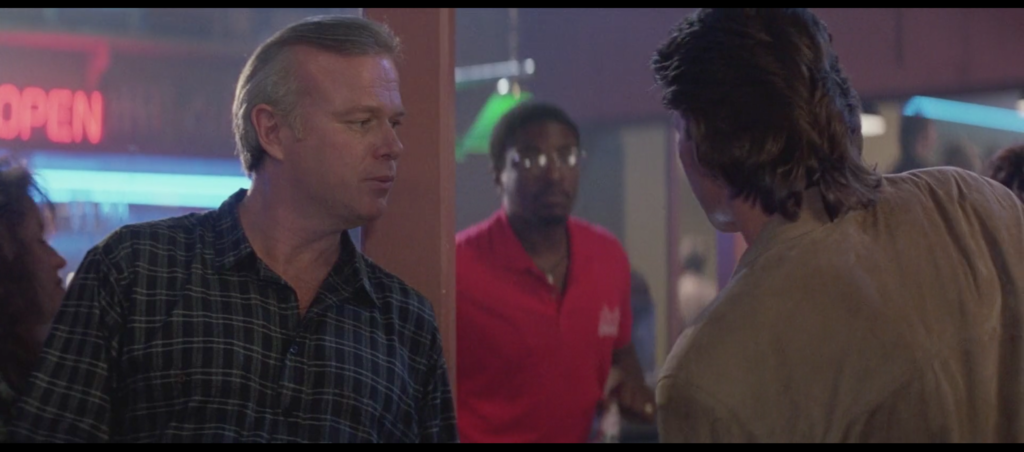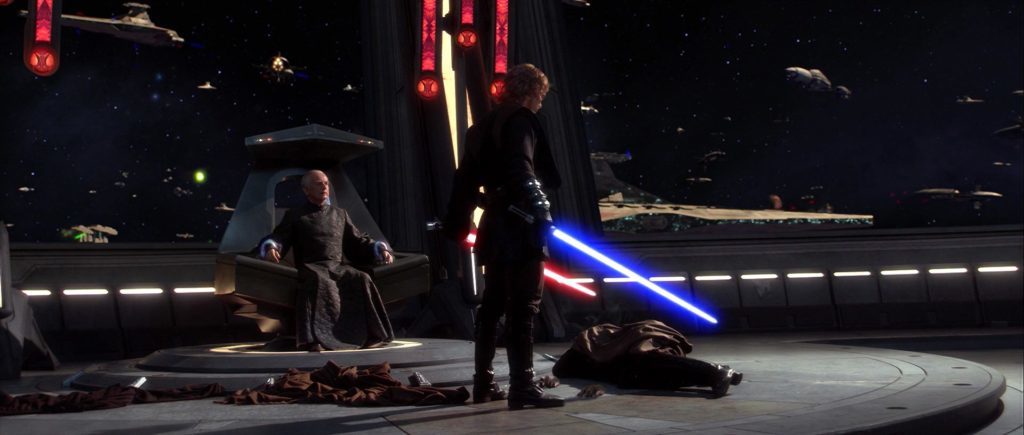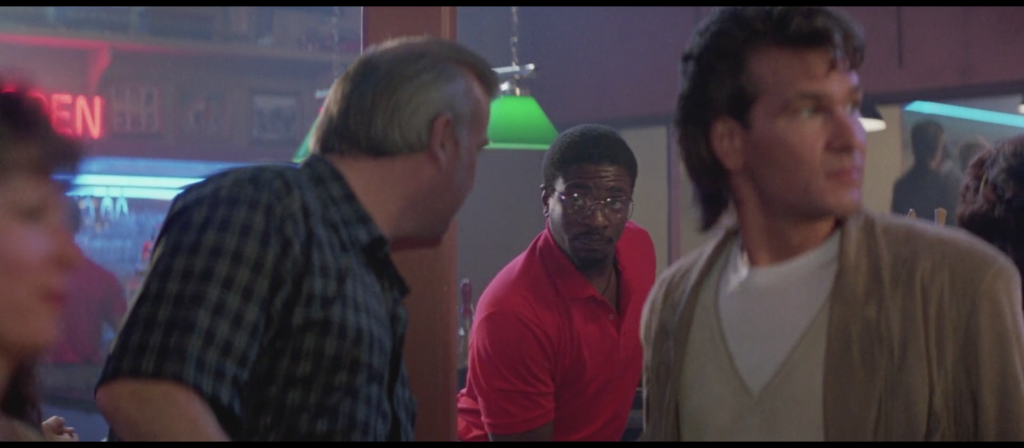Posts Tagged ‘whiskey’s running low’
193. Why won’t they deliver
July 12, 2019Dalton may be all smiles, but Frank Tilghman has frustration to burn. Whiskey’s running low, you see, and oh how steamed he is about that. “I finally get this place just the way I want it and now we’re running out of booze,” he spits, with a sardonic half-laugh for emphasis at the end. “I’ve called every supplier I know,” he continues. “Why won’t they deliver.”
Expected a question mark at the end there, didn’t you? Yes, one would, wouldn’t one. But in that standard Road House flourish, the question is delivered as a statement. Yet something’s off here. This isn’t Doc or Dalton or Wesley supplying an answer they believe they already know—that Dalton feels entitled to collect money for beating people up, that Doc thinks Dalton’s life is too ugly to be a part of, that both Wesley and Dalton know he committed a crime not acted in self defense when he killed a man. Frank’s affect in every respect but the lack of a rising tone of voice indicates that he has no clue why people are refusing to sell him liquor anymore. It’s just a little thing that he phrases it as if he knows, right?
Well, Dalton knows the answer, that’s for sure. “Wesley,” he says authoritatively, before grabbing the phone and making a call we will later be able to deduce was to his mentor Wade Garett for help. It’s interesting, though, to watch Tilghman’s face here. When Dalton answers his “question,” he doesn’t react at all. No surprise, no “I knew it,” no “Jesus, he’ll stoop to anything,” no “goddamn that bastard”—flat. He just takes it right in stride.
Almost. His question is a non-question, yeah, and his response to the answer is nonexistent. But when Dalton turns toward the phone, look at Frank’s eyes. Follow them as he gives Dalton a quick once-over. It’s not like he hasn’t seen Dalton before, and as much of a pleasure as it is to look at the guy it seems like Tilghman’s mind should be on other things right now. Things like the matter of the liquor blockade of his bar, the culprit behind which Dalton has just named and against whom he now appears to be placing a call for aid.
Unless that is what’s on his mind when he looks Dalton up and down while the cooler isn’t looking. But why would that be? Why would Tilghman size Dalton up while thinking about Brad Wesley’s role in the Double Deuce’s plight? Why would he want to get a good look at the man who just informed him Wesley is responsible? Why would he sneak an analytic glance at the man he’s effectively placed in charge of battling Brad Wesley for control of the town, after feeding that man the information required to initiate the next round of hostilities? Why would he want to get a very close read on Dalton’s affect, his body language, the clues he might give as to how deeply he’s thought this matter through? Why did he not react with surprise when Dalton told him what he’d figured out? Why did he supply the question as if he already knew the answer himself? What is the specific concern regarding Dalton, and Wesley, and his own relationship with both men, that leads Frank Tilghman to act so suspiciously?
192. ‘Whiskey’s Running Low’: The Tragedy of Keith David in ‘Road House’
July 11, 2019The man in the red shirt is Keith David. You may remember him from his roles in John Carpenter’s The Thing and They Live, two of the best science fiction and horror films ever made. In each he plays the main foil to the protagonists—rough-hewn salt-of-the-earth working-class white-guy types, with tough-as-nails attitudes and impressive heads of brown hair, who find themselves unexpectedly drawn into conflict with forces larger than themselves. Road House, you’ll note, stars Patrick Swayze as a rough-hewn salt-of-the-earth working-class white-guy type, with a tough-as-nails attitude and an impressive head of brown hair, who finds himself unexpectedly drawn into conflict with a force larger than himself.
Naturally, in Road House, Keith David plays a bartender whose sole line of dialogue is “Whiskey’s running low.”
That’s not quite all there is to the role. His name, uttered by both Tilghman and Dalton in this scene, is Ernie, and getting named is an honor precious few supporting characters in this film enjoy. He’s mentioned by name more than all the other bouncers and bartenders and waitresses still employed by the Double Deuce at this point in the film combined, save for Carrie Ann, who says her own name and gets it yelled at her by Pat McGurn. Everyone else? Bupkis.
What’s more, he’s listed with a surname in the closing credits. This too is more than can be said for virtually anyone in the movie. Jimmy, for example, went by “Jimmy Reno” during filming—you can find interview clips with Patrick Swayze in which he calls that character by name, it comes up frequently in interviews with actor Marshall Teague, and it’s in the IMDb listing—but is merely “Jimmy” in every official respect. Dalton himself only gets a mononym unless you inspect his medical file.
Most strikingly, Keith David appears in the opening credits. He’s billed fifth, after only Patrick Swayze, Ben Gazzara, Kelly Lynch, and Kevin Tighe, and just before Kathleen Wilhoite. The actors who play Emmett, Red, and Denise all get lumped together in a single triple chyron, which is fair enough. Sam Elliott gets a “And SAM ELLIOTT” to conclude the cast listing, which is appropriate. Jeff Healey slides in later on via an “Featured Music Performance by The Jeff Healey Band” slug. Other characters you think might reasonably get listed up front—Jimmy, Tinker, O’Connor, Ketchum, Morgan, Pat, Jack—aren’t there at all. Ernie’s fellow bartender, who’s there since the beginning, is entirely uncredited.
If you’ve watched David deftly dance between antagonist, supporting character, and stealth protagonist in The Thing, or if you’ve watched his world-building alley fight with “Rowdy” Roddy Piper in They Live, you probably have some questions about all this. God knows I do.
As best I can ascertain, partially from half-remembered poorly sourced comments in various Road House posts across the internet, and partially based on my own conjecture, is that Ernie Bass was originally a much more prominent character, the bulk of whose storyline wound up on the cutting room floor. I suspect he was a famous bartender, whom Dalton brought in to elevate the Double Deuce’s standing further still—surrounding himself with a surrogate family of old friends which also included Cody, his bandmates, and Wade Garrett. While the material was cut for time, contractual obligations kept David in the picture and in the credits.
A questionable decision, to be sure. Were David cast in a fighting role he’d be an invaluable asset to the film, and even as simply a gnomic presence dispensing basso profundo wisdom behind the bar he’d be a huge get. Instead? He hands Dalton a coffee with a nod of acknowledgement. He tells Tilghman “Whiskey’s running low.” He hands Dalton a phone. He looks at Wade Garrett. He looks at Wade and Dalton together. Exit Ernie Bass, pursued by an editor.



